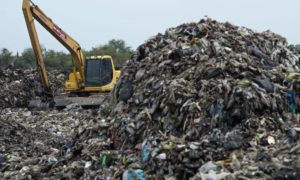The vast amount of waste accumulated as part of efforts to tackle the COVID-19 pandemic poses a threat to human and environmental health, the World Health Organization (WHO) has cautioned.
The WHO Global analysis of health care waste in the context of COVID-19: status, impacts and recommendations bases its estimates on the approximately 87,000 tonnes of personal protective equipment (PPE) that was procured between March 2020- November 2021 and shipped to support countries’ urgent COVID-19 response needs through a joint UN emergency initiative. Most of this equipment is expected to have ended up as waste.
Discarded syringes, used test kits and old vaccine bottles have piled up to create tens of thousands of tonnes of medical waste, putting a huge strain on healthcare waste management systems, the United Nations health agency expressed in a new report on Tuesday.
Additionally, more than 140 million test kits have been shipped, with the potential to generate 2,600 tonnes of mainly plastic and enough chemical waste to fill one-third of an Olympic swimming pool.
Some eight billion vaccine doses administered globally were also estimated to have produced an additional 144,000 tonnes of waste in the form of glass vials, syringes, needles and safety boxes.
The UN health body called for reform and additional investment, including through the reduction in the use of packaging, using PPE more rationally and investing in non-burn waste treatment technology.
About a third of healthcare facilities aren’t equipped to deal with existing waste loads, the WHO said. Overwhelmed waste systems, especially in lower-income nations, mean that health-care workers face the risk of needle injuries and burns, as well as exposure to pathogenic microorganisms, the WHO said. People residing near poorly managed landfills and waste disposal sites are at risk of contaminated air and poor water quality.
What's happening in Tunisia?
Subscribe to our Youtube channel for updates.















































